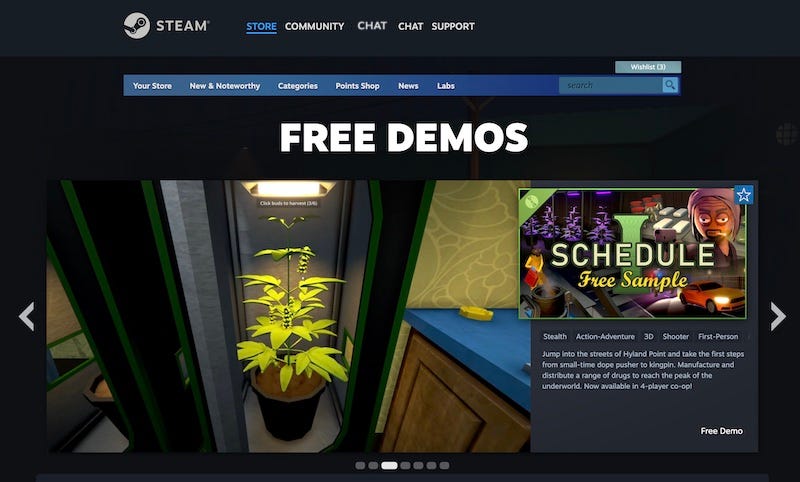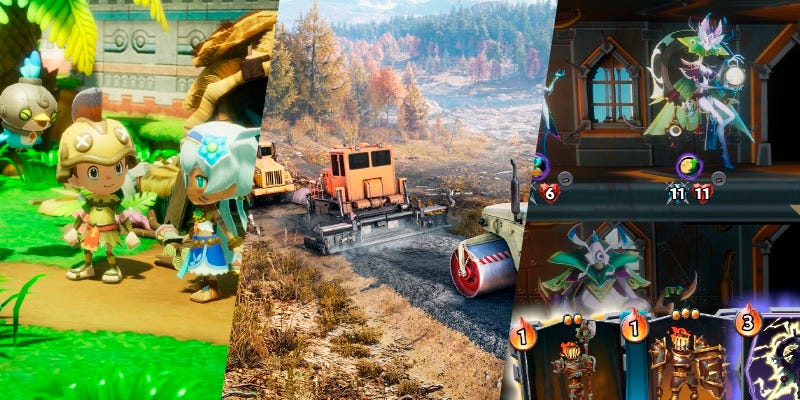Why timing your game's demo release matters!
And some pitfalls! Also: lots of discovery news & the big Steam releases.
[The GameDiscoverCo game discovery newsletter is written by ‘how people find your game’ expert & company founder Simon Carless, and is a regular look at how people discover and buy video games in the 2020s.]
Well, it’s Friday, but there sure is a lot still going on. So we’ll kick off with news, go to a lead story on demo timing, and end up - for our GameDiscoverCo Plus & Pro subscribers - with a number-filled analysis of several big Steam launches this week!
Before we start, an opportunity: our buddies Christopher Dring (& Geoff Keighley) at The Game Business have a neat event at the Grammy Museum in LA on Mon, June 9th & our readers can apply to attend for free if you’re in town for ‘not-E3’! (Oh, and four days left for our GameDiscoverCo x Oakland Ballers’ ‘Scrappy Game Jam’, hah!)
Discovery news: SteamOS has new overview page
Let’s kick off, with a trawl through an inexorably increasing amount of things you need to keep on your radar. Starting with this:
Valve’s new ‘SteamOS’ landing page is interesting, in that it says: “We’re currently working with select partners on officially licensed Powered by SteamOS devices” (So, more besides the Lenovo Legion Go S? And the SteamOS recovery & installation page also explains how to unofficially install SteamOS on Legion Go & ROG Ally.)
Checking Footprints.gg’s tracker of top ‘trad media’ written coverage (above), it’s not surprising that Switch 2 is dominating proceedings, ahead of its June 5th release date. Also charting: Doom: The Dark Ages (which hit 3 million players, a significant majority on Game Pass), GTA 6, Clair Obscur, and Stellar Blade.
Former Nexon CEO Owen Mahoney has an interesting piece breaking the game biz into four, with axes from offline to online and casual to hardcore, adding that financial analysts “trained on the ‘packaged goods’ model… expect a classic [long tail-y] Product Lifecycle… but online games - especially live services - don’t behave that way.”
It’s true: Fortnite is “now available on Apple's app store in the US after being taken off the platform nearly five years ago.” Elsewhere, Brett Nowak noted other iOS games getting more web-store aggressive: “When I opened Clash Royale today… the app-entry popup promoted and sent me straight to the Supercell web store.”
Microlinks: Nintendo is apparently using Samsung to build the main chips for Switch 2 instead of chip giant TSMC; Microsoft blames Apple for its delayed Xbox mobile store; Sony’s slightly odd PlayStation Stars digital loyalty program is closing - no new members, and it’ll shut completely in November 2026.
Here’s a very good follow-up on the ‘deprofessionalization of the game biz’, with academic Brendan Keogh opining: “I think a much better analog… is the music industry. There's a bunch of bands… and some of those will be very successful. But when they are successful, they're not gonna hire 50 more drummers.”
In ‘making use of catalog x cloud streaming’ news, Xbox launched a ‘Retro Classics’ app for Game Pass members in collab with Antstream, including “50+ classic Activision games from the ’80s and ’90s… like Grand Prix, Kaboom!, Mech Warrior 2… and Pitfall.” (It’s the PS1 version of MW2, unfortunately, but it’s a perk!)
In a new Shigeru Miyamoto interview focused around Super Nintendo World’s U.S. theme park expansion, we’re still deep in Nintendo’s crossmedia era, with Miyamoto marveling: “We've come to a point where even people who don't play video games recognize Nintendo characters.” (He’s also a witty guy, by the way.)
Would you like some marketing support from PlayStation, Xbox and Nintendo for your console game? Of course you would, and Pirate PR has a FAQ/explainer on what you need to do to get each platform to post your trailer on their official YouTube channels - with some potential social media support too.
Circana’s Mat Piscatella breaks down April 2025 U.S. hardware (& select software) charts, down 3% to $4.1b & with Bethesda’s Oblivion remaster atop PC, Xbox and PlayStation charts “generating more full game dollar sales than the original’s first 14 months combined.” Console hardware spending was down 8% to $186m, tho.
Well-made tower defense game Tower Dominion is a decent-sized Steam hit - we now have it at 83,000 copies sold in just over two weeks. And Jordan Brown tried to break down some of the promotion the game did - noting not much trad social media uptake, but a lot of organic (and some paid) streamer interest.
Microlinks: Xbox Game Pass’ latest adds include Metaphor ReFantazio (nice get!), The Division 2 and Tales of Kenzera: Zau; Warhammer 40k: Space Marine 2 is opening its internal tools to modders - good move; Trump’s FTC is walking away from the org’s post-hoc attempt to unwind the Microsoft x Activision Blizzard merger.
Why timing your game's demo release matters…
We’ve written obliquely about demo timing several times - most recently in our Cash Cleaner Sim behind-the-scenes from Tuesday, where the publisher explained how they timed two different Steam demos for separate ‘discovery beats’. But two other first-hand accounts of demo goodness made us realize - we should do a whole piece on this.
The first is from Oro Interactive producer Hans Haave (re: Easy Delivery Co.), who suggests: “With Steam Next Fest coming up I think it's worth talking about demos… you should NOT wait until the last moment to push your demo. Publish it 3-4 weeks earlier - do your own push before outlets & creators get inboxes flooded + less competition in [the front-page chart] Trending Free.”
This touches on one of the most confusing parts of the rise of the game demo as a discovery mechanism - and remember, demos are a discovery mechanism, not a ‘try before you buy’ tool, folks! It’s the following:
From an ‘on-Steam’ player perspective, Valve’s Next Fest demo showcases (which we cover extensively) are in a very high-profile front-page feature slot. Therefore: some newer devs are tempted to target only and solely Next Fests for demos.
But from a ‘share of voice to players’ point of view, Next Fest is super crowded, with ~2,500 demos being ‘randomly’ shown to players early in the Fest. (There’s a lot more personalized recommendation later, but that’s how the Fest starts.)
If you believe influencers playing your game are key to discovery, then their inboxes around Next Fest are a complete mess of exhortations to play demos. So, frankly, targeting organic uplift may be even more difficult during Next Fest.
That’s not to say we don’t appreciate Next Fest. It’s just, as Hans says, it can be “very hit or miss when it comes to providing a clear injection of wishlists, traffic, and hype to your game.” (Especially in its new, much more egalitarian format.)
Of course, with so many games out there, all promotion is hit & miss. So, what to do? Oro’s Haave notes that: “Steam does a lot of thematic events now [and] third party showcases and events often require something playable for their audiences.” For example, the narrative-focused LudoNarraCon had playable demos that ‘trad media’ checked out.
What we tend to advise - to people who ask - is to make a ‘marketing beat’ around releasing or updating a demo at least twice: once in a quieter period, and once during Next Fest. That way you can have your cake and eat it too, discovery-wise.
But there’s an argument that even thinking about ‘releasing’ and ‘unreleasing’ demos is hopelessly retro. We’ve been talking more to Bertrand Vernizeau, the funder & publisher of medieval combat game Half Sword, which we profiled last December when it had ~600k wishlists.
Half Sword’s approach is to permanently keep their demo open, but ‘content patch’ it with big updates. (This isn’t a tiny demo!) They just announced that the latest tech demo patch “has been downloaded over a million times for the month of April alone”, and influencers playing it briefly got it into the Twitch Top 10-most streamed.
Bertrand shared the game’s Steam wishlist increases after the new April 2025 patch dropped. And they’re hefty, to say the least - the game now has >1.1m wishlists:
Obviously, Half Sword is a special game. Its gory/silly combat mechanics are systemically interesting, and not that easy to clone or emulate. But the creators have “decided to keep our demo open with a more similar approach to Schedule 1's Free Sample”, rather than yoink the demo on and off availability.
Bertrand tells us that the point of a continuing ‘tech demo’ is to tell players: “try for yourself, try early & let me know what I should improve.” And he adds: “The open demo, especially if patched regularly, is extremely counter-intuitive for publishers and investors, but less so for developers.”
We agree - the idea of giving away a largish chunk of the game for free, for many months before the game comes out, is potentially terrifying. But if you are confident in your ‘game hook’ , core loop and retention, why not do just that?
Other games we’ve profiled like Backpack Battles did exactly that: “Backpack Battles has had a demo live [for 9 months before release] and demo players maxed out at an almost unheard of - for micro-indies - 18,960 CCU (concurrent users). We were surprised about both the update cadence and longevity for the game’s demo.”
So perhaps the ultimate evolution of game demos - if you’re the right type of game - is ‘run a free, improving version of your game constantly to run up interest before launch.’ At which point, prospective players are never without a demo to try. It’s worth a thought, huh? Because at that point, the best timing is… all the time?




